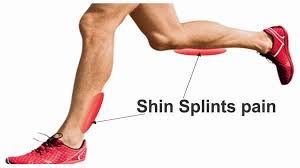Shin splints is a very common complaint and is more common in runners than other athletes. The pain you will experience is normally felt on the front of your shin.
There are numerous reasons that you may be suffering from this condition, the most common are:
- Poor running technique
- Running on hard surfaces
- Overdoing it
While shin splints is not a serious condition, it can cause you a lot of discomfort and can even stop you wanting to exercise. It is very important to listen to your body and not run through the pain. The pain you are getting is a sign telling you to stop or slow down.
What are the early signs of shin splints?
- Pain that begins soon after you have started to exercise
- Pain that gradually improves when you rest
- Pain that start as dull and achy but may become sharp and severe
- Pain that affects one or both shins (front of leg)
- Possible swelling on your shins

How do you get diagnosed with shin splints?
If your pain does not improve over time and with rest, it is advisable to see a physiotherapist for a thorough physical examination of your lower body. They may also:
- Ask about your symptoms in detail
- Review your running technique on a treadmill
- Refer you for a scan to help with the diagnosis if necessary
- Advise you have some sports physiotherapy where they can assess your injury, show you some good exercises, and recommend a suitable programme to do daily to help you on the route to a quick recovery
Can shin splints be treated?
Yes. Shin splints can be treated and the best way to do this is to follow a program of physiotherapy. The following will also help relieve your pain and get you on the road to recovery:
- Ensure rest days between exercising
- Ice daily
- Take over the counter pain relief if needed
- Run on grass rather than pavement
- Keep your weight at a good level
- Strengthen your core and lower limb muscles, particularly your hips
- Contact a sports physiotherapist if you’re unsure what exercises you should do
- Try to switch the physical activity that you do such as include swimming in your regime
- Have a deep tissue massage to release any trigger points
- Gradually increase your running in intensity, distance, and frequency to give your muscles time to adapt to any increase in your physical activity
- Always stretch before and after exercising
- Ensure you are wearing properly fitted shoes with good arch supports
Below are some suggested stretches for you calves and shins. You can hold each exercise for 30 seconds and repeat each one five times:

At Home Physio Group we can help you improve your body biomechanics so that you can eventually return to running. Treatment will include soft tissue massage and targeted exercises. Over a number of weeks, you should see great improvements.
For more information on how we can help you recover from shin splints and also help prevent them from reoccurring, please call Home Physio Group on 0330 335 1016 to see how sports physiotherapy can help you.
